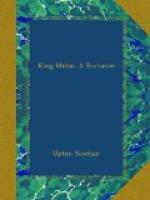The burden of the winter
The year haa borne too long,
And oh, my heart is weary
For a springtime song!
The moonbeams shrink unwelcomed
From the frozen lake;
Of all the forest voices
There is but one awake
I seek thee, happy streamlet
That murmurest on thy way,
As a child in troubled slumber
Still dreaming of its play;
I ask thee where in thy journey
Thou seeest so fair a sight,
That thou hast joy and singing
All through the winter night.
Helen was silent for a few moments, then she said, “I think that is beautiful, Arthur; but it is not what I want.”
“Why not?” he asked.
“I should have liked it when you wrote it, but now the spring has come, and we must be happy. You have heard the springtime song.”
“Yes,” said Arthur, “and the streamlet has led me to the beautiful sight.”
“It is beautiful,” said Helen, gazing about her with that naive unconsciousness which “every wise man’s son doth know” is one thing he may never trust in a woman. “It could not be more beautiful,” she added, “and you must write me something about it, instead of wandering around our pasture-pond on winter nights till your imagination turns it into a frozen lake.”
The young poet put away his papers rather suddenly at that, and Helen, after gazing at him for a moment, and laughing to herself, sprang up from the seat.
“Come!” she cried, “why are we sitting here, anyway, talking about all sorts of things, and forgetting the springtime altogether? I haven’t been half as happy yet as I mean to be.”
She seemed to have forgotten her friend’s twelve mile walk; but he had forgotten it too, just as he soon forgot the rather wintry reception of his little song. It was not possible for him to remain dull very long in the presence of the girl’s glowing energy; for once upon her feet, Helen’s dancing mood seemed to come back to her, if indeed it had ever more than half left her. The brooklet struck up the measure again, and the wind shook the trees far above them, to tell that it was still awake, and the girl was the very spirit of the springtime once more.
“Oh, Arthur,” she said as she led him down the path, “just think how happy I ought to be, to welcome all the old things after so long, and to find them all so beautiful; it is just as if the country had put on its finest dress to give me greeting, and I feel as if I were not half gay enough in return. Just think what this springtime is, how all over the country everything is growing and rejoicing; that is what I want you to put into the poem for me.”




